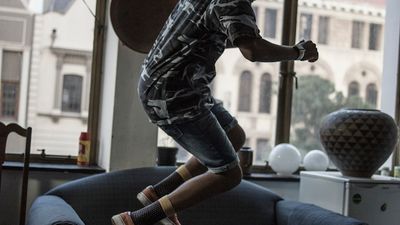Catching Up With Cape Town Producer Wildebeats Fresh From The UK
Okayafrica caught up with Cape Town's Wildebeats following his trip to the UK to perform at the Roundhouse in London.


Photo by Core Wreckah
In the aftermath of Live Magazine South Africa and The British Council's FutureMusic “mini-tour” series in JHB and Cape Town, which included performances from the likes of BLK JKS (ZA), DJ Fonque (ZA), DJ Mma Tseleng (ZA), Zaki Ibrahim (ZA/Canada), Okmalumkoolkat (ZA), Dirty Paraffin (ZA), Christian Tiger School (ZA) and more, hip-hop-house-inspired electronic beatmaker Mohato Lekena, aka Wildebeats, was selected (along with the Brother Moves On) to travel to the UK and perform at the Roundhouse in London. Fresh from spreading love for South Africa's beats scene in frosty London, Mo had a quick chat with us to talk #futuremusicrising, electronic music and the intricacies of both scenes, at home and abroad. Read our full interview below and watch Wildebeats' whole set recorded live from the Roundhouse over here.
Shiba for OKA: Welcome home! So tell us a bit about the competition and what it took to win the trip.
Mo (Wildebeats): It was essentially a three stage competition, that started with people first submitting information such as a bios, soundcloud pages and youtube links. 86 people entered at this stage, and from these 6 were chosen to perform either in Cape Town or Joburg, and from these 6, two were chosen for the UK. So basically dope music and a bit of luck is what it took for me to win
OKA: What were the first few days like? Did you manage to do a little crate digging while out there?
Mo: Overwhelming! It took like 5 hours after landing for me to actually talk to a Brit because there’s people from all over the place there, and so many to meet. Looking for vinyl records was also crazy because you have to go in looking for specific things, not just saying you’ll see what's good, because they have so much good stuff. I’m pretty proud of the bounty I came back with though. What was mad was listening to the radio that side, because it sounded just like some local stations, like 5fm, except that all the music was local for them in the UK. They even played more music from North and West Africa than I might hear here.
OKA: I can imagine how trippy that must have been. Tell us about the 22Tracks mix. All of the tracks are by electronic artists from South Africa, yeah? How did you go about selecting those?
Mo: It was actually pretty difficult, because there’s so much dope music but you always want to balance just putting personal favourites and representing a scene or whatever. So after much meditating on the peak of Lions Head I just decided to go with stuff I had been listening to over the past weeks. This was stuff that I had found through local blogs, word of mouth and live gigs.
OKA: Tell us what it was like live at The Roundhouse...
Mo: The Roundhouse is so much more than just a venue, and it is actually round. Playing there live, knowing who had played before, was crazy for me. After the performance though, after having seen and met the other headliners from the UK I really feel like I, and by extension all my musician homies back in SA, aren't that far off from that level, in terms of performance.
OKA: How do the scenes in the UK and SA differ? I mean, with the scene, comes a certain type of people, the ways in which they party and the places they express themselves in. If you could draw parallels between the two places, what would they be?
Mo: I really got the feeling that more people that side treat their music careers as work - not that they don't enjoy themselves, just that they're that serious and focussed about getting things done and know the steps towards doing them quickly. The whole time I was at The Roundhouse there were always some dudes around practicing Mixing on some CDJs or performing to themselves in tiny rooms just to make sure they’re tight.
Maybe the biggest difference in terms of the party scene there is probably infrastructure and numbers. There are enough people going out in the city that no matter how small a percentage of the population a particular sub scene relates too it's still a large number of people supporting it. So big clubs could pack out to underground and weird DJs, and because it's fans in there they’ll dance till 7am when the club closes. I guess when you’re facing potential frostbite everytime you go to the club it means you’re dedicated to the cause.
Being honest though, its difficult to sum up an entire scene.
OKA: What’s trendy out there right now? Is it the "scramble" for Africa[n music] like some might think?
Mo: I heard a lot of deep tech and deep house while I was out there, and we all know South Africa are the secret (not so secret) kinds of deep house. I also did hear a lot of Nigerian pop, which was seriously refreshing. While I’m not sure what constitutes a scramble, there is a healthy and growing respect for music coming out of the continent. I think I saw the John Wizards LP in almost every store I went to.
OKA: What was the reception like to the South African sound, and what stood out most for you on your trip?
Mo: The great energy that our music was received with that side. Having been there I can see that there are a lot of South African artists who I think could own that side, but also a lot of growth our scene still has to experience. I’m really glad to have been able to gain all this perspective.
